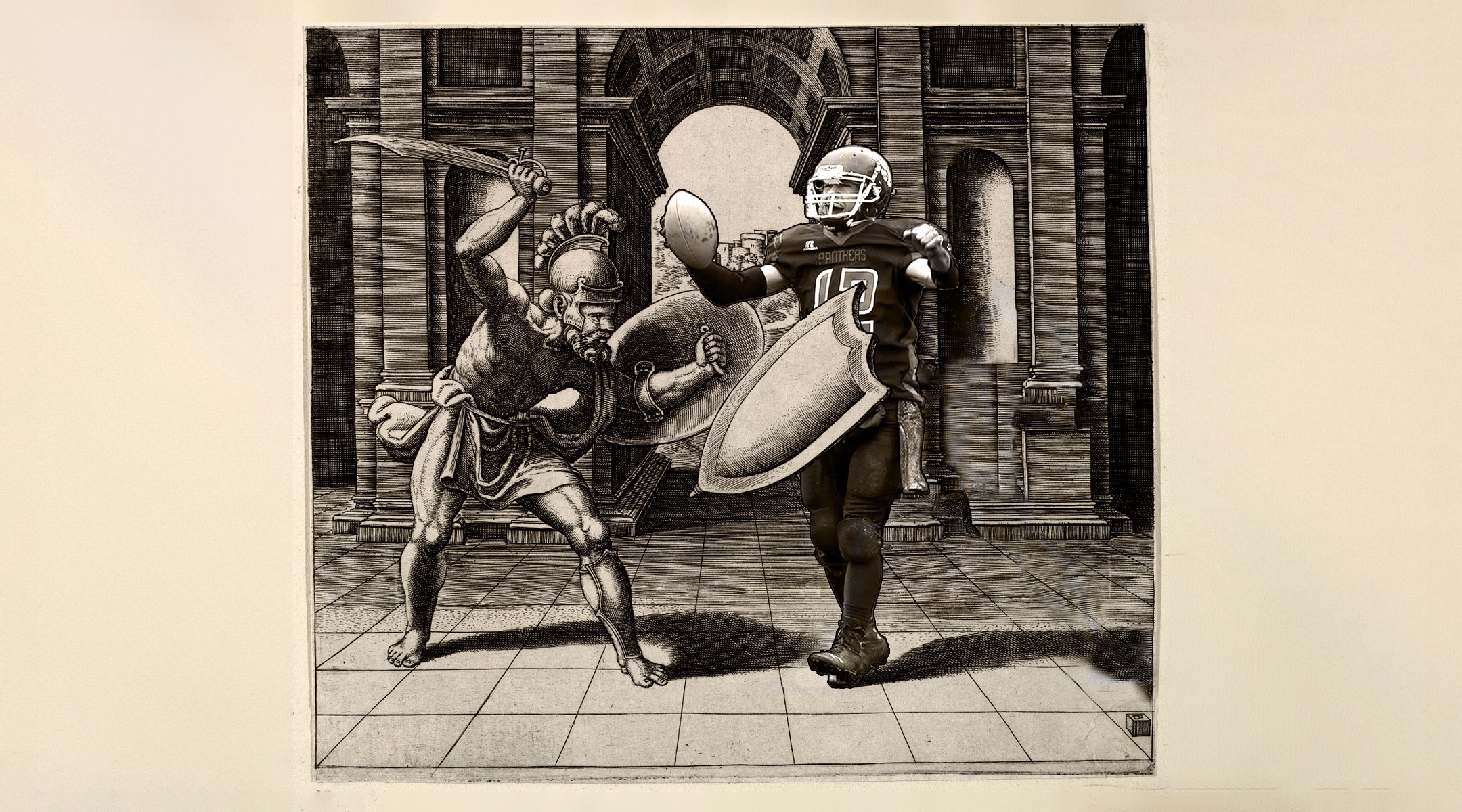Can a Jewish fan watch the Super Bowl with a clean conscience? The rabbis had thoughts.
Jewish text grappled with the violent nature of sport, writes a scholar and educator at The Jewish Education Project

(JTA illustration by Grace Yagel; Images: Harris Brisbane Dick Fund 1953, Creative Commons)
(JTA) — In January, 24-year-old Damar Hamlin of the Buffalo Bills collapsed on the field after experiencing cardiac arrest. His team and the entire NFL community rallied around him. His first words upon awakening: “Who won?”
Although Hamlin’s medical crisis was a rare on-field occurrence, the trauma surrounding his collapse stirred up age-old questions for me, and for many of us, about the toll football takes on the bodies of its players. What are we allowing to happen to these young men, in the name of sportsmanship, entertainment and national identity? When the Super Bowl airs on Sunday, what is our responsibility as spectators?
While still a newcomer to football, I turned to Jewish texts to help me find answers, and fascinatingly, I found a striking parallel between the rabbis of old and two contemporary journalists.
In 2009, in a scathing critique in The New Yorker, Malcolm Gladwell denounced the game for the serious and long-lasting damage it does to players — especially traumatic brain injuries and debilitating neurological disorders resulting from repeated blows to the head — and placed the blame squarely on the fans. “There is nothing else to be done, not so long as fans stand and cheer,” he wrote. “We are in love with football players, with their courage and grit, and nothing else — neither considerations of science nor those of morality — can compete with the destructive power of that love.”
William C. Rhoden wrote a heartfelt piece after Hamlin’s collapse, where he reflected on his own experience as a professional sports reporter of over 40 years. “We’re used to ferocious collisions and mostly happy endings. We applaud the player as he walks off the field, then sit back down in our seats, in our suites, in our press boxes and focus on the next play,” he wrote. “I realized, with sadness, the extent to which I had become desensitized to the real-life violence of our national pastime.”
Gladwell and Rhoden both recognize that football has inherent violence, and that as spectators we have an obligation to contend with it. Gladwell is pointing to the fans’ desire for violence, which makes them culpable in the destructive nature of the sport. Rhoden asks fans to notice their own callousness as they behold the effects of that violence.
This same dichotomy is reflected in the rabbis’ understanding as well. Indeed, many of the rabbis of the Talmud lived in the Greco-Roman world, when gladiators would battle with one another to the death, for thousands of people to watch. One of the most extolled rabbinic figures, Rabbi Shimon Ben Lakish, is said to have himself been a mighty gladiator who eventually escaped that life to become a great sage.
In the Tosefta, an ancient Jewish legal code contemporaneous to the Talmud, a question is raised about whether one is allowed to attend Roman amphitheaters and stadiums. For some of these venues, the concerns center around viewing and possibly participating in forbidden idol worship, or associating with foolishness and taking time away from more serious pursuits.
However, by far the greatest concern is that of attending events in stadiums where violence is prevalent. Indeed, the text goes as far as to say that “one who sits in a Stadium, is one who sheds blood.” (Tosefta Avoda Zarah 2.2) Here we see the same concerns that Gladwell raised, that by being a spectator of this violence, you are yourself more than a bystander. Indeed, if there were no fans, there would be no audience for these violent spectacles — making fans directly culpable in these acts of bloodshed.
The Tosefta then quotes another perspective: “Rabbi Natan permits [going to Roman stadiums] because of two things: because of crying and saving a life and because of testifying for a woman that would remarry.”
Rabbi Natan here desires to find justifications for why one could attend these events. He refers to the idea that during a gladiator event, the crowd could cheer for the losing fighter, and beg for mercy so that he would not be killed. A Jew is therefore permitted to attend because they could potentially save a life. An additional reason: They could also provide eyewitness testimony to a person’s death, thus causing the victim’s wife to become free to remarry.
Recently, while learning this text with my colleagues at The Jewish Education Project, we understood Rabbi Natan as showing a keen understanding of the reality of his time. People will attend these games, and these games are a part of the Jewish community’s life. Rather than forbidding them from going, he explains that there are positive motivations for their attendance.
In many ways, this matches the Rhoden position as well. He assumes we will continue to watch sports, report on games and enter fantasy football leagues. Yet, what should our motivations be as we watch these games? Do we voyeuristically cheer for the violence, enjoying the hard hits? Or can we re-sensitize ourselves and remind ourselves that these are human beings with families, and futures after their playing days are over?
I am still thinking about those awful moments in Buffalo, when Hamlin fell to the ground. All that time he spent training, the myriad ways he has broken his body for our viewing pleasure, and the lengthy rehabilitation ahead of him.
For those of us who will watch the hard hits this Sunday, I offer a charge: Do not allow yourself to ignore the pain and violence you see. Actively re-sensitize yourself to the humanity of these players. Commit to understanding what the policies are that will make this sport safer, and demand their implementation. Watch this game as Rabbi Natan teaches: with the intention to call out for justice wherever you can.























